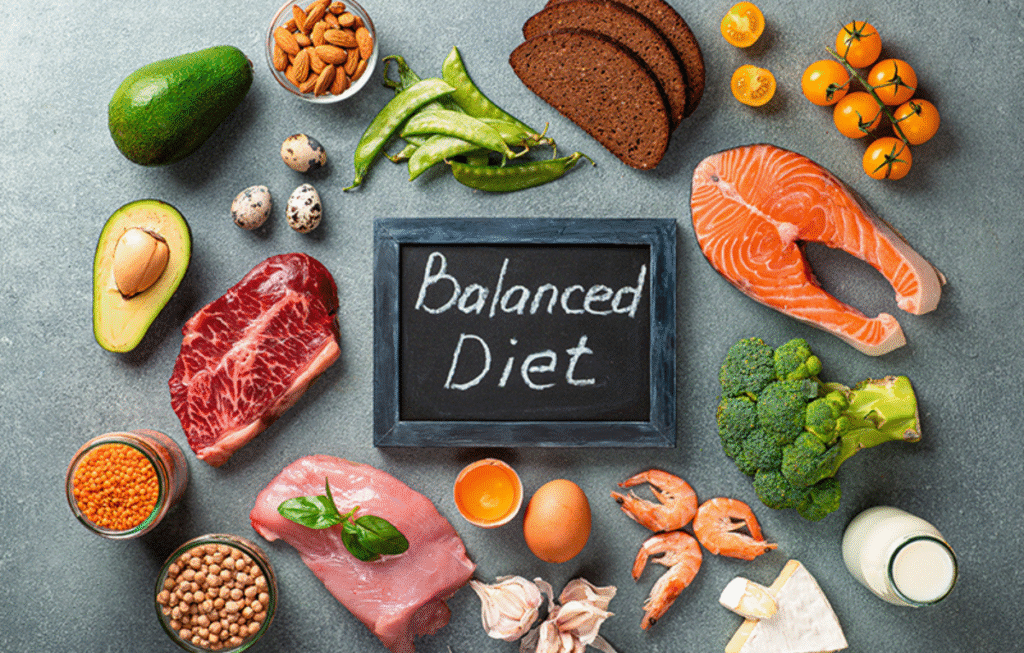At EOSA, we do not just work on-field skills but off-field skills with our players in their routines, their diet and fitness. Healthy nutrition and exercise are core areas of success for all players.
While kicks, passes and goals are good indicators of player’s development, the diet, recovery and lifestyle is also significant
This guide will demonstrate how diet, fitness and lifestyle can help your child raise their game, whether they are beginning or already a high-performance player.
Why diet and fitness is important for youth players.

Football is a game where the body as well as the mind is used at the same magnitude. Apart from running, they need to take charge, make intelligent choices, and literally get in touch with their teammates.
The entire process needs energy and energy comes from food, beverages, rest and physical training.
Eating properly, sleeping well and training properly can yield numerous advantages:
- They can play during games for longer durations.
- They recover fast from injuries.
- Their bone and muscle strength improves.
- Their focus and decision-making improve.
- They feel no fatigue, dehydration, or cramps.
Back at EOSA, our coaches never get tired of lecturing us about “holistic development.” This implies that though tough training on the pitch is highly crucial, off-pitch traits are just as crucial.
A Healthy Diet for a Shiny Football Player
The body of children playing sports is yet to be made. Therefore, their food needs to be full of nutrients rather than calories.
Let’s define their dietary needs:
(a) Carbs – The Energizer
The players in a match are in need of immediate energy. They get this energy from carbohydrates.
To name a few:
- Whole grains – brown rice, oats, quinoa, whole wheat pasta
- Fruit – bananas, apples, oranges, berries
- Starchy vegetables – sweet potatoes, peas, corn
Athletes are advised by EOSA nutritionists to consume complex carbs before any training or competition because it will be the body’s long-term energy source.
(b) Protein – Building muscles and repairing them
The muscle of the athlete undergoes the breakdown and re-building process during exercise. Protein is the workhorse in this process.
Sources of Protein:
- Chicken, fish, eggs, lentils, kidney beans, tofu, milk, yogurt
Tip: Consumption of a small amount of protein food, such as yogurt or a hard-boiled egg, soon after the exercise is helpful in muscle recovery.
(c) Fats – The Quiet Energy Providers
Individuals have bad thoughts about fats, but it is true only to a limited extent. Our bodies do need good fats.
Source of Good Fats:
- Avocado
- Oils, seeds, and nuts (almonds, walnuts, sunflower seeds, olive oil, coconut oil)
- Fish rich in fat (salmon)
For EOSA, the total calories of a sports person, 20–30% should be derived from fats.
(d) Vitamins and Minerals – The Secret Heroes
The machinery of the body works well due to the availability of vitamins and minerals. They maintain the bony framework strong, enhance immunity, and control energy.
Essential Elements:
- Iron (for the transportation of oxygen in blood)
- Calcium (for bones)
- Vitamin D (from sun and milk)
- Potassium (for muscles)
Sportsmen need to take colored vegetables, fruits, and greens daily.
Hydration: The Body’s Fuel
Water is the most widely overlooked component by the majority of athletes. And it is extremely crucial to stress that the removal of even one percent of total body water will result in decreasing your performance.
EOSA’s Hydration Tips:
- Make drinking water your routine from the very beginning of your training.
- Drink 5-7 ounces of water every 15-20 minutes.
- After workouts or games, consume electrolyte beverages.
- Avoid soda and energy drinks—they give you short-term energy followed by quick exhaustion.
Example:
A 14-year-old footballer taking part in a 90 minutes long game needs to drink 2-2.5 liters of water daily.
When and what to eat: Proper timing
Timing is as crucial as the food.
(a) Pre-training meal (2–3 hours before)
- Brown rice + grilled chicken + steamed vegetables
- Whole wheat pasta + tomato sauce + small piece of cheese
(b) 30–60 minutes before practice
- Banana or granola bar
- Fruit and yogurt smoothie
(c) Post-training recovery (within 30 minutes)
- Chocolate milk
- Yogurt and fruit
- Peanut butter sandwich
With this coordination, the body’s energy moves smoothly and the fatigue feeling is reduced to minimum.
EOSA’s Fitness Training Model: The Strength, Speed, and Agility Combo

The primary intention of training at EOSA is to employ the entire body in the training process, not merely the skills.
(a) Strength Training – Body Building
For the younger players, their start is through bodyweight exercises and not weights.
Examples:
- Squats, Lunges
- Planks
- Push-ups
- Core Twists
They are very significant for the kids in their learning of stability and balance.
(b) Speed and Agility Training
When it comes to football, the effect of time is so minimal, almost a second, that it is the determining factor whether the goal will be achieved or whether the opportunity will be wasted.
EOSA’s Speed Drills:
- Cone Drills
- Ladder Runs
- Short Sprints
- Reaction Time Games
All these points will result in not only an increase in the players’ speed but also their capability of turning around quickly.
(c) Endurance Training – Stamina Development
Soccer matches last for various durations, 60 to 90 minutes, for which the players must be highly active and dynamic. The interval running method, shuttle running, and mini-games are the methods EOSA uses to train the endurance of players during exhaustion of a match.
(d) Flexibility and Recovery
Flexibility is an excellent means of injury prevention; therefore, EOSA has stretching exercises after each training session as a preventive measure.
Additionally, the players also practice yoga and breathing exercises as mental training to keep them calm and composed.
Sleep and Recovery: Athletes’ Secret Weapon
Sleeping is not just the time off for the body; this is the period when it undergoes the entire process of healing. Throughout the sleeping hours of sportspersons’ days, the muscles are being repaired, and the brain’s memory is being created.
EOSA Sleep Guidelines:
- Sleep for 8-10 hours each night.
- Stay away from your phone light and television light before going to bed.
- Get your bedroom dark and quiet.
Extended sleep deprivation slows a player to respond, becomes less focused, and more susceptible to injury.
A Balanced Day of Eating – EOSA Style
- Breakfast: Whole grain toast + eggs + fruit + milk
- Snack: Banana and yogurt
- Lunch: Chicken Wrap + vegetables + rice
- Pre-practice snack: Granola bar + apple
- Post-practice: Protein smoothie
- Dinner: Grilled fish + quinoa + steamed vegetables
- Light snack (if needed): Almonds or fruit
This diet provides a person with sustained energy and helps in the recovery process.
Parent’s Role: Fitness Begins at Home
We at EOSA hold the belief that the parents are the most influential aspect in a child’s development.
What Parents Should Do
- Pack healthy bites for the games.
- Encourage children to recognize their hunger and fatigue.
- Get moving – walk, bike, or yoga together.
- Do not purchase junk food but reward reaching milestones.
Children eventually adopt the healthy lifestyle of their parents if they see them being healthy.
EOSA’S COMMITMENT: BUILDING PEOPLE, NOT PLAYERS

East Orange Soccer Academy works not in creating players but in creating confident and resilient human beings for life.
There are trainers, coaches, and nutritionists all working together to ensure that every athlete is healthy in body, mind, and spirit.
The kids are reminded throughout the training session that “what you put into your body is what you get back on the field.”
Conclusion: True champions come from inside
The victory in a soccer game is not a question of talent alone, but of conditioning, diet and hard work as well. We instruct at EOSA that with a combination of fitness, diet and sleep, they will be the true winners.
Kids who are educated to remain fit and healthy will not only be the ones with higher prospects of competing as athletes but also they will be the ones who are more sure of themselves in life. If you are on the lookout for an off-field champion for your kid, EOSA is the place for them.
FAQs:-
What kind of foods should young athletes eat before a game?
A balanced meal with complex carbs, lean protein, and fruits—like pasta with chicken or oatmeal with bananas—is ideal before a game.
What foods should players avoid?
Processed foods, sugary drinks, and fried snacks should be limited as they slow down recovery and reduce stamina.
What’s a good post-game recovery meal?
Meals with protein and carbohydrates—like grilled chicken, rice, and vegetables—help rebuild muscles and restore energy.
